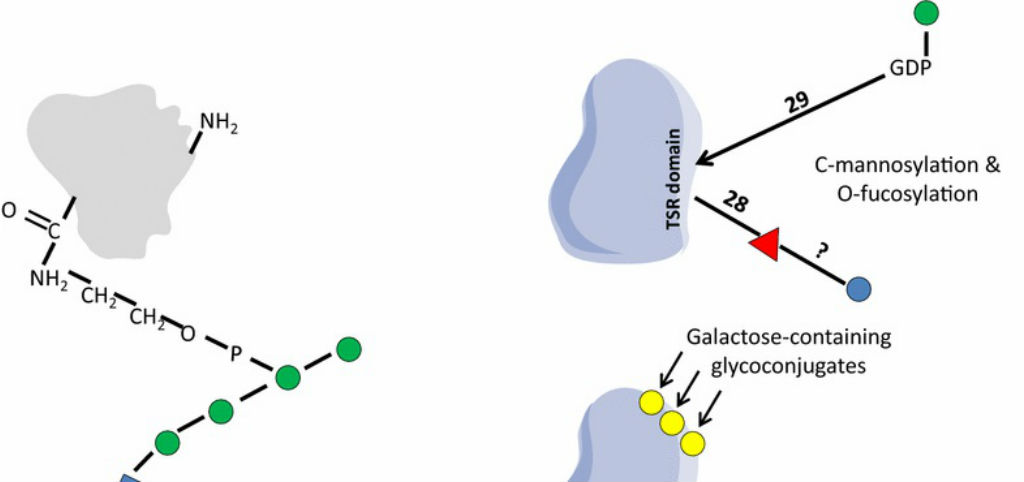AlphaGal
Exploration of the singularities of the sugar nucleotide metabolism and description of novel glycosylation pathways in the malaria parasite

- Duration
- 01/01/2017-31/12/2019
- Coordinator
- Luis Izquierdo
- Funded by
- MINECO (Spanish Ministry of Economy)
We are progressively uncovering evidence pointing to the presence of short, non-complex glycosylations in Plasmodium parasites. Recent work reports that unknown a-galactose (a-gal) containing glycoconjugates on the surface of Plasmodium sporozoites induced antibody production providing sterile protection in malaria-infected mouse models. In addition, IgM antibodies against these a-gal antigens are associated with protection from P. falciparum infection in humans. In agreement, our work has revealed the unexpected presence in P. falciparum blood stages of a pool of UDP-galactose, which is the donor substrate of all galactosylation reactions, describing a probable biosynthetic pathway. Anti-a-gal based immunity is conferred in the pre-erythrocytic stages of parasite infection (i.e. prior to liver invasion) suggesting that malaria transmission could effectively be controlled at this important bottleneck of the parasite life cycle. Such level of sterile protection is not achieved with current vaccine development, making these a-gal-containing antigens an attractive therapeutic candidate for immunization.
Using as springboard our broad experience on the glycobiology of the malaria parasite, we propose to perform a complete characterization of the glycosylations found on the surface of extracellular forms of the parasite life cycle, focusing in Plasmodium sporozoites and merozoites. The aim of the proposed research is to use integrated glycomics, glycoproteomics and biochemical approaches aided by recent advances in analytical technologies, to verify the presence of Plasmodium glycoconjugates expressing specific immunogenic sugar epitopes. Furthermore, we aim to dissect the specificity of the anti-a-gal antibodies in individuals from endemic areas, as a tool to obtain valuable data about the immunodominant glycotopes responsible for eliciting anti-a-gal-associated protection against P. falciparum.
Altogether the investigation of these and other uncommon parasitic glycosylations may expose an unanticipated Achilles heel in the Plasmodium parasite that could be exploited to induce sterile protection against malaria, mimicking what has already been achieved using carbohydrate-protein conjugate vaccines against bacterial infections.
Total funding:
80,000 €
Our Team
PI
-
 Luis Izquierdo Lázaro Associate Research Professor
Luis Izquierdo Lázaro Associate Research Professor
ISGlobal team
-
 Miriam Ramírez Laboratory Technician
Miriam Ramírez Laboratory Technician
Other projects
See Past ProjectsNHEPACHA
New Tools for the Diagnosis and Evaluation of Chagas Disease
RTS,S Vaccine Immunology Study
Study of immune correlates of protection against malaria after vaccination with RTS,S/AS01E: a comprehensive immunological arm of a Phase III double-blind, randomized, controlled multi-center trial
Euroleish.net
Control of Leishmaniasis. From bench to bedside and community
GREPIMER
Grup de recerca en patología importada i malaties emergents i re-emergents
TESEO
New chemotherapy regimens and biomarkers for Chagas Disease
ASINTMAL
Unravelling Disease Tolerance and Host Resistance in Afebrile 'P. falciparum' Infections: a Prospective Study in Mozambican Adults
ADAM
Malaria mass and focal drug administration to advance malaria elimination in Mozambique: accelerating programmatic implementation and policy translation
Science4Pandemics
Citizens engagement digital platform for collective intelligence in pandemics
HIDDENVIVAX
Novel organ-on-a-chip technology to study extracellular vesicles-mediated cryptic infections in Plasmodium vivax malaria
Subclinical Infections in Children and Long Term Health Effects
Infection acquisition in early life and health outcomes in childhood - MARATO TV3
Herramienta innovadora de detección de enfermedades y vacunación a población inmigrante en riesgo en España
Project Code: PI21/00651
Impacto de las coinfecciones en el balance de respuestas de anticuerpos y linfocitos T helper a antígenos diana de inmunidad natural y vacunal frente a patógenos humanos prominentes
Project Code: PI20/00866
EpiGen
Building Scalable Pathogen Genomic Epidemiology in Ethiopia
MalTransc
Transcriptional regulation of adaptation and developmental decisions in malaria parasites: from epigenetic variation to directed transcriptional responses
BOHEMIA
Broad One Health Endectocide-based Malaria Intervention in Africa
RESPONSE
Mechanisms of the transcriptional responses to changes in the environment in the malaria parasite Plasmodium falciparum
VivaxEVTalk
Extracellular Vesicles as Intercellular Communicators and Biomarkers of Cryptic Erythrocytic Infections in Plasmodium vivax malaria
VaMonoS
Unravelling the heterogoneity and function of monocytes in vaccination and immunity to malaria
CLIMSOCTRYPBOL
Insight on climate and social participatory research for integral management of vectorborne zoonosis caused by Trypanosoma cruzi and Leishmania spp. in the Bolivian Gran Chaco.
SexMal
Social affairs and sex in P. falciparum: implications for malaria elimination
MENA Migrant Health
Transforming data collection and surveillance to drive migrant health research, care and policy
MESA
Sharing knowledge and catalyzing research towards a malaria-free world
SMART
Identifying Severe Malaria with a new Aptamer-based Rapid diagnostic Test
GlycoTargets
New antimalarial therapies targeting the glycosylation pathways of ‘Plasmodium falciparum’
GenMoz
P. falciparum genomic intelligence in Mozambique



